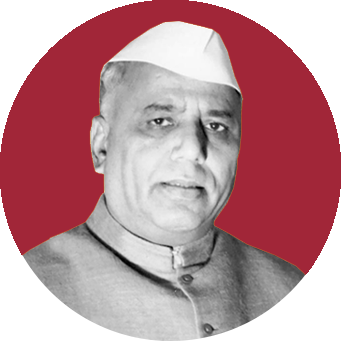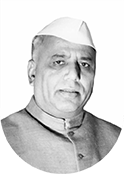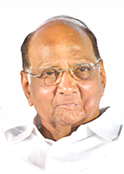
Shri Yashwantrao Chavan was a leading figure among the visionaries who realized that India, after independence, needed an administration that not only maintained law and order but also had a vision for development. He didn’t stop at the mere realization of the fact, he implemented the idea and established an ideal administration in Maharashtra as well as in India, leaving his indelible imprint on the administrative system of the country. Yashwantrao was known as the ‘Leader of Common People’ as all his political, social and financial policies focused on common people. He created an identity of Maharashtra as a progressive state on national level.
As a representative of the young generation of Maharashtra, which was raised on his ideology, I have tried to describe Yashwantrao in this article as I saw and liked him. Of course, the question, which ideology, is also important here. Ardent patriotism, unshakeable faith in democracy, secularism, nurturing goodwill among all human beings and worshipping virtues not caste in various spheres of social life were some of the values cherished by Yashwantrao who always strived to inculcate the same in the youth. Yashwantrao’s contribution in keeping the society united in Maharashtra will never be forgotten. As a student, I got to see him on some important public occasions.
Be knowledgeable and be wise. There is a difference between knowledge and wisdom. Knowledge of various subjects is essential from the point of view of science; But in my opinion, the science of using that knowledge in social life is wisdom.
After the Chinese attack on India, Pandit Jawaharlal Nehru called Yashwantraoji to Delhi. During those days, a saying was popular in Maharashtra - "हिमालयाच्या हाकेला धावला सह्याद्री” (Sahyadri mountain range comes rushing on the call of Himalayas) where Sahyadri symbolized Yashwantrao as a representative of the entire Maharashtra state. Yashwantrao played a crucial role in this testing time for the nation, which made him popular as a formidable leader even in small villages of Maharashtra. Therefore, Youth used to throng in larger numbers to listen to his public speeches in the 1970s. Yashwantrao used to have a natural communication with his audiences through these speeches and kept his command on the speech till the end, making a great impact on the minds of the listeners. Simple but elegant dressing style with the jacket like that of Nehru, gracious gait and a knack to strike the chord with the audience attracted the youth towards him in the 70s.
I remember an incident from 1976. Yashwantrao had come to Kolhapur for the inauguration of Shahu Institute of Management, now known as CSIBER, which was established in the name of Chhatrapati Shahu Maharaj. I was present in the audience for that function. As far as I remember, the people on the stage included Shri. Vasantdada Patil and Poet G. D. Madgulkar among others. We students were curious to listen to what Yashwantrao had to say. After completing the formalities of inauguration, Yashwantrao stood up to speak. He was well aware of fact, that he had come for the inauguration of an institute for postgraduate education in business and management. Even though he had a written speech, he only referred to it occasionally and spoke to the audiences directly. He had an uninterrupted dialogue with the attendees. The central theme of his speech was the need of management studies for developing countries. Like a well-versed orator, he began his speech with the examples from the Western countries and came to the point why management education is essential for rural Maharashtra. For development-oriented administration, it is not enough to have robust economic policies, efficient mangers are also needed for its implementation. He hoped that the institution would develop such professionals. As a student, I was deeply influenced by his speech, hence I chose a career in the field of Management Education and Training. I am sure, many rural students like me made management as their career-choice. The credit for this definitely goes to the speech of Yashwantrao.
The most important part of his speech was the need for developing countries to have good management for economic development. Later in the career as a teacher of management, I had a privilege to listen to the Nobel Laurette Dr. Amartya Kumar Sen and the economic adviser to then Prime Minister of India, Sukhamoy Chakraborty’s speeches and I realized how important is the financial management. However, the greatness of Yashwantrao’s vision lies in the fact that, he gave a mantra to take management studies to the corners of rural Maharashtra in 1976. A significant characteristic in Yashwantrao’s personality was that he never provided only an idea but also created opportunities for the working-class graduate youth in different fields and brought them in the mainstream. Leadership in the fields of agriculture, industry, co-operation and education in the rural of Maharashtra has come from such strata of the society and these very people have built magnificent temples of development. Yashwantrao identified talent in the common man, developed it and used it positively in various sectors of society. Isn’t it what we call today Talent Management? He achieved it quite naturally.
Yashwantrao is known as the Architect of Modern Maharashtra. He laid the foundation of Maharashtra's agriculture and industrial sector in the 1960's, in which he ensured that agricultural and industrial growth would complement and nurture each other. Taking together the economists like Dr. Dhananjay Gadgil, he built the foundation of Maharashtra's rural economy on the principle of cooperation. He had recognized the importance of balance between agriculture and industry. I remembered this on the occasion of the World Economic Forum held in 1986, because the very theme of the conference was – the balance between agriculture and industry. The fact which was recognized by Yashwantrao in the 1960s and based on which he had chosen the agricultural and industrial development model for Maharashtra, was realized by the eminent economists on global level in 1986! This exhibits the foresightedness of Yashwantrao.
No one is born great. We were all small, we had big challenges and big problems before us, we grew up because we had the courage to accept those challenges and face them. It is this attitude of accepting challenges that brings out the best in a person, and the basic challenge facing today's young generation is to be ready to accept challenges.
Of course, behind this vision was not just a dream, but an ideological foundation formed through in-depth reading and contemplation. He developed a habit of reading from his secondary school days. Before passing the matriculation examination, he had read the works of the best writers from the western world. A sound ideological foundation formed through in-depth reading and contemplation is as much important to run a state as an ardent yearning for social welfare. Realising this truth, Yashwantraoji had read at length during his imprisonment from time to time for Indian Independence after 1930. A list of the books on a variety subjects he read while in prison is available. The list includes books on philosophical politics, the philosophy of sovereignty, histories of different nations, autobiographies of various historical figures, labour movement, texts of Karl Marx, intense nationalism, Russian revolution and humanism. Apart from this, Yashwantrao also read in depth about India's poverty, food policy, health and agriculture.
In the wake of the global recession, he studied L. Robbins’ ‘The Great Depression’. Along with this, he also studied books and reports such as Irrigation in India, Agriculture Statistics of India. Yashwantrao also read the book 'Economic Problems of Modern India edited by Dr. Radhakamal Mukherjee.
This was very important from the perspective of the young generation as it taught them that intensive reading is a prerequisite to understand a problem. This ideological foundation used to help Yashwantrao in taking a decision on critical financial problems facing the country. This is why his underlying approach to economic issues was holistic. Economic development involves social inspirations along with political problems. Therefore, Yashwantrao insisted that economic development shouldn’t be founded only on the basis of technical theories but also have a broader perspective.
Yashwantrao knew that Maharashtra needed a development-oriented administration, which required manpower with financial management skills. That is why he placed economists like S.G. Barve in the cabinet of Maharashtra and laid the economic foundation of a progressive state. S.G. Barve was eminent economist. He was an Honours Student of the University of Mumbai, which covered a vast area from Kutch to Karachi in those days. At that time only four students were selected for Honours and S.G. Barve was one of them. Since my father was also one of the four students, I knew about S.G. Barve. Yashwantrao included him in the Cabinet first as the Finance Minister and then as the Industry Minister, to shape the economic and industrial policies of Maharashtra and gave an expert person like him, ample freedom to take decisions. Yashwantrao showed through his actions that it is necessary to give enough freedom to experts in financial decision making. Even after becoming the Finance Minister of India, the position that Yashwantrao gave to the experts in that field made the decision-making process more professional and definitely helped in creation of development-oriented administration.
Yashwantrao not only laid the foundation of Maharashtra's agro-industrial policy, but also created a network of institutions necessary for its effective implementation. A Connoisseur of People, he chose the ‘best’ persons in every field, created a network of good people and activists. The credit of creating an identity of Maharashtra as a progressive state, thus goes to him. Yashwantrao used the formula of ‘Selecting the right people for the right job' from the modern management theories for the financial management of Maharashtra. ‘Good Governance’ is a hyper-used word today, but the visionary embedded the concept in the system in Maharashtra in the 1960s. This is something to be gratefully acknowledged. Progressive decisions taken in many areas in Maharashtra were accepted at the national level over time and the model of development of Maharashtra was indirectly adopted at the national level. This reflects Yashwantrao’s vision.
Thanks: Lokrajya













